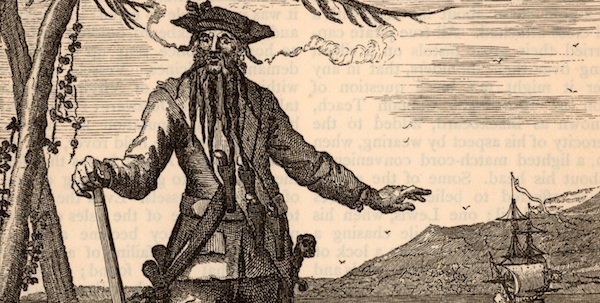
In 1718, the famous pirate and his cronies were finally brought down by a former British privateer
After 15 years of war and not 10 months of peace, British authorities realized they had a problem on their hands in the spring of 1714: a failed state astride one of the most important sea-lanes in the New World. Embarrassingly, it was one of their own colonies.
Something unpleasant was brewing in the war-ravaged Bahama Islands. The French and Spanish had sacked the archipelago’s former capital, Nassau, four times during the just-ended War of Spanish Succession, torching the town, spiking the fort’s guns, carrying away the governor and most of the island’s slaves, and forcing the rest of the population into the jungle.
Now, Bermuda’s governor, Henry Pulleine, warned that the survivors were living “without any face of government, every man doing only what’s right in his own mind.” Pirates had stepped into the vacuum, wreaking havoc on nearby Spanish settlements and merchant vessels, and poison-
ing the prospects for trade.“Until the Bahamas are settled in some form,” Pulleine concluded, “they will [remain] a nest of pirates.”
Indeed, the Bahamas were about to become the epicenter of one of the greatest piracy outbreaks of all time: a maritime uprising that would sever Britain, France, Spain, and the Netherlands from their New World empires, cut off trade routes, stifle the flow of goods and information, and threaten the colonies themselves.
Although it would last less than a decade, it would be known as “the Golden Age of Piracy,” and its leaders—Edward “Blackbeard” Thatch (whose surname is often erroneously referred to as “Teach”), “Black Sam” Bellamy, Stede Bonnet, “Calico Jack” Rackham, Mary Read, and Anne Bonny among them—would become the stuff of legend. Fortified in the Bahamian base, they would soar to unprecedented heights of both power and popularity, threatening the social and economic underpinnings of King George’s empire. British military policy not only failed to nip this piracy outbreak in the bud but was also one of its primary causes. And as the Bahamian pirate gangs grew in strength, the Royal Navy was impotent to respond, its warships in America and the West Indies being poorly manned, supplied, and maintained after expensive wars in Europe and among the European colonies.
Even after the king made suppressing piracy a priority, the world’s most powerful navy remained ineffective, as the Admiralty failed to adjust to the subtleties of asymmetric warfare.
When the Royal Navy did succeed, it was usually the result of luck or clever alliances with civilian authorities, who had access to the manpower and equipment naval captains lacked. Indeed in the end, the pirates would be defeated not by the warships of the Royal Navy but by privately financed expeditions, posses, mercenaries—and a man named Woodes Rogers.
Piracy was nothing new in the early 18th century: bandits had been prowling the seas since ancient times, and the late 1600s had seen a sizable outbreak of English piracy off East Africa. But the Bahamian pirates were different from those that came before them in that they didn’t see themselves as engaged in simple theft. Rather, most felt they were involved in a social revolt against the ship owners and captains who had made their lives miserable when they had served in the merchant marine or navy. The pirate Samuel Bellamy oversaw a crew who referred to themselves as “Robin Hood’s Men.”
In a decidedly authoritarian age, these Caribbean pirates elected their captains and could depose them at any time by a popular vote. They shared their plunder equally and some bands even provided primitive disability benefits; Paulsgrave Williams and his gang gave their boatswain a large cache of treasure on account of “his being wounded amongst them,” while anyone in Bartholomew Roberts’s crew who became “a cripple” or lost a limb was given the equivalent of £200—nearly a decade’s wages for a merchant sailor—“from the common stock” of treasure.
On Blackbeard’s vessels, black men and Native Americans could serve as equal members of the crew, a policy that drew huge numbers of escaped slaves to his ranks; people of African descent composed a quarter of a typical pirate crew, and an outright majority on one of Blackbeard’s ships.
[continued on next page]




